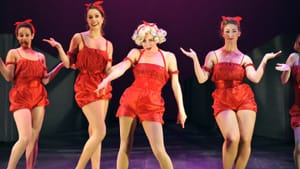Stay in the Loop
BSR publishes on a weekly schedule, with an email newsletter every Wednesday and Thursday morning. There’s no paywall, and subscribing is always free.
Move over, Taylor Swift
My favorite rhymes

“Blank Space,” Taylor Swift’s new Number One hit song about her allegedly wild dating life, contains the following alleged rhymes: Reckless/breathless; Face/mistake; Insane/name; Storm/thorns; Torture/warn ya; Flames/pain; Pain/insane/game.
You will search the entirety of this song’s two verses, three choruses, three pre-choruses and one bridge for a single inventive rhyme or, in many cases (as my sampling above attests), for any rhyme whatsoever. Is this Taylor Swift a wild and crazy rebel or what?
Back in the day when hit songs depended entirely on words and music (as opposed to video images of sexy women slashing oil paintings and bashing sports cars), lyricists were mocked for rhyming love with above or life with wife — but at least those words rhymed. As you will see by reading this column and clicking my links, the best lyricists won fans by devising creative rhymes to seemingly unrhymable words — like cockeyed, substitute, sandwich, music, victim, Puerto Rican, initials, prison, and, of course, Philadelphia — not to mention some words that most likely never entered Taylor Swift’s vocabulary, such as hypotenuse and plebeian. For example:
Hammerstein and Gershwin
- W.S. Gilbert, “I Am the Very Model of a Modern Major-General,” from The Pirates of Penzance (1879): “About binomial theorem I'm teeming with a lot o' news / With many cheerful facts about the square of the hypotenuse.”
- John H. Flynn, “Yip! I Adee! I Aye,” from The Merry Widow and the Devil (1908): “Now, sometimes the music / Makes me sick and you sick.”
- Oscar Hammerstein II, “Life Upon the Wicked Stage,” from Show Boat (1927): "When you let a feller hold your hand, which / Means an extra beer or sandwich."
- Ira Gershwin, “It Ain’t Necessarily So,” from Porgy and Bess (1935): “The things that you’re liable / To read in the Bible.” Also: “I takes the Gospel / Whenever it’s poss’ble.”
- Oscar Hammerstein II, “People Will Say We’re in Love,” from Oklahoma (1943): “Grantin' your wish, / I carved our initials on that tree.”
Cows and chickens
- Hammerstein, “There Is Nothing Like a Dame,” from South Pacific (1949): “We got nothing to put on a clean white suit for; / What we need is what there ain’t no substitute for.”
- Frank Loesser, title song from Guys and Dolls (1950): “Love is the thing that has licked 'em / And it looks like Nathan’s just another victim.” Also, from “A Bushel and a Peck,” in the same show: “The cows and chickens / Are goin' to the dickens!”
- Hammerstein, “Shall I Tell You What I Think of You?” from The King and I (1951): “I do not like polygamy / Or even mod’rate bigamy. / I realize that in your eyes / This clearly makes a prig o’ me.”
- Ned Washington, “Do Not Forsake Me, O My Darlin’,” from High Noon (1952): “He made a vow while in state prison / Vowed it would be my life or his'n.”
- Arthur Schwartz and Howard Dietz, “That’s Entertainment!” from The Band Wagon (1953), summarizing the plot of Hamlet: “Where a ghost and a prince meet / And everyone ends in mincemeat.”
- Arthur Hamilton, “Cry Me A River,” (1953): “Told me love was too plebeian, / Told me you were through with me, an’…”
- Stephen Sondheim, “The Jet Song,” which opened West Side Story (1957): “Every Puerto Rican’s / A lousy chicken.”
- Sheldon Harnick, “The Bum Won,” from Fiorello! (1959): “I’m in a bad state of shock; I’d / Like to know just how the hell it happened / What we did right — fellas, the whole thing is cockeyed.”
- Allan Sherman, “Sarah Jackman” (Tune: “Frere Jacques”), from My Son, The Folk Singer (1962): “How’s your brother Bentley? / Feeling better ment’ly.”
The Philadelphia challenge
- As for words that rhyme with Philadelphia — actually, those remain to be found. But two lyricists have come close:
Irving Berlin, “Oh! How I Hate to Get Up in the Morning,” from Yip, Yip, Yaphank” (1918): “I’ll put my uniform away / And move to Philadelphi-ay.”
And Sherman Edwards, “Sit Down, John!” from 1776 (1969): “It’s hot as hell / In Philadel- / phia.”
But I digress. Sunday night, Taylor Swift opened the American Music Awards show with a wild performance of “Blank Space” in which she portrayed herself as a madwoman and maneater by feeding a boy a poisonous apple, holding burning roses, and darting crazy-eyed looks at the camera every few seconds. Later that evening, Swift received the show’s first-ever Dick Clark Award for Excellence, which is sort of like receiving a Chris Christie Award for Subtlety. Which raises one question: If Taylor Swift won this award for excellence, who were the losers?
I know, I know — years hence, some future Dan Rottenberg will bemoan the sad state of pop music in 2065 and pine for the lost wit and sophistication of the likes of Taylor Swift.
Sign up for our newsletter
All of the week's new articles, all in one place. Sign up for the free weekly BSR newsletters, and don't miss a conversation.

 Dan Rottenberg
Dan Rottenberg